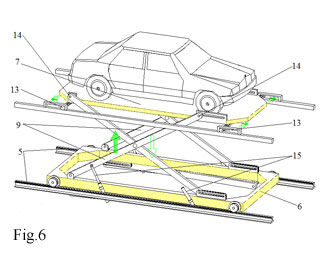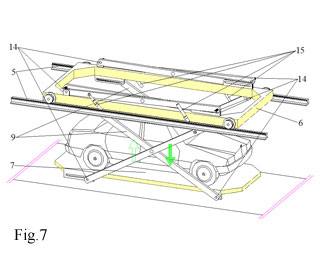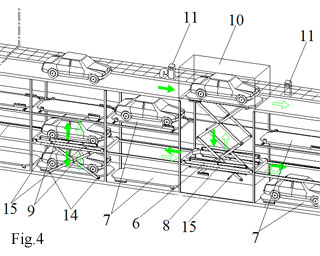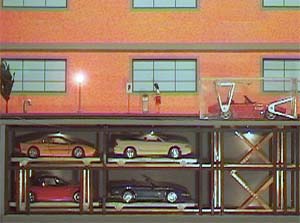

 |
 |
 |
 |
under Streets and Pedestrian Areas

@ 1024*768
Browser:
are constructed under the surface of streets, pedestrian areas and other public spaces.
The existing other mechanical car parks, automated parking station systems and also those
of traditional type, non mechanical parking stations, are constructed underground or over
ground in public or private areas. These car parks and parking station systems occupy
large areas of land belonging to the State or private companies, they waste a lot of space
(30sqm for a car instead of only 12sqm in our system) and are not usually situated near the
driver’s place of work or home. They have a capacity for a minimum percentage of cars; the
result of this is the continuation of illegal parking on the streets and the hindrance of traffic.
The price of land for these car parks and parking station systems, require extremely large
amounts of money to be invested, a fact that makes them disadvantageous.
The advantage of this invention is that it is constructed by the State or the Municipality or
by self-finance methods or by private companies and ensures that most of the residents of
every house or apartment will have permanent parking spaces in front of their houses.
Some of the advantages by economical, environmental, aesthetical and traffic circulation importance point of view that
results from the manufacture of "Mechanical Underground Car Parks Under Streets and Pedestrian Areas" are:
- Facilitation of traffic circulation.
- Reduction of environment pollution.
- Small distance of parking spaces from driver's residence.
- Extremely low cost of manufacture comparatively with the other solutions.
- Source of income for the municipalities and the solution of parking problem.
- Very profitable financial investment because of very short time of amortization of invested capital.
- Exceptionally increased safety for the car, that is provided by the storage in the underground mechanical parking.
- Confrontation of stress that accompany the citizen in his daily search for parking place (home, work, amusement etc).
- Possibility of release of 70% of street's surface from cars and output of this space to the Municipality for exploitation.
- Minimization of disturbance of street residents and shops owners because of short time required for the manufacture.
- Doubling or tripling of parking places for same street length depending on which type of system will be manufactured.
Courts, malls, Public Services Buildings etc. that are located in the center of the city. It also requires minimum financial
investment because buying or expropriation of private building plots is not needed because it is constructed in a public
area. It will also derive a substantial profit from selling or renting the parking areas or alternate parking with a time-limit
parking meter. Finally, it's not causing a traffic disturbance on a large scale because the opening of the trench is done
very quickly with the modern excavating machines. After excavation, a waterproof and compact longitudinal tunnel is
constructed by the moulding, construction of supporting walls, the tunnel flooring and roof. After completion, the street is
immediately open to traffic. The remaining mechanical and electrical installations are completed underground inside the
tunnel without any further disturbance to the traffic. It is indicated that the surface parking spaces on the street remain as
they were before.
Automated Car Parking Systems - Car Parks - Mechanical Parking - Mechanical Underground Parking System


How "Type 1" system works
of supporting walls, floor and roof of reinforced concrete, which form tunnels (1), and they are used as an underground
parking space for parking cars by mechanical means (mechanical underground car parks or parking system). The driver
is driving on the street and in order to park he stops at the waiting zone, when his turn arrives, he inserts his card in the
parking meter (11), after that, the entrance garage-door of the enclosure (10) opens and he drives in and steps on the
platform (7) that has previously been raised to street level and has blocked the opening of the tunnel (1). Following this,
the driver locks his car and leaves through the entrance door (garage-door) which is then secured automatically.


www.parkingstation.com - Mechanical Parking - Automated Car Parking Systems - Mechanical Car Parks
pistons (15), or another kind of elevator is placed on the trailer (6) that rests underneath it, the platform (7) is then
stabilized by anchor pins (14), the trailer (6) then moves on the rails (5) and by the assistance of an automated system
(computer), finds the nearest empty parking space, where it is immobilized again. Afterwards, (Fig.1) from the floor of the
empty parking space, the lever system (9) or elevator is raised by the assistance of pistons (15) and after it unlocks the
anchor pins (14), it takes the platform (7) with the car and passes it through the internally hollow trailer (6). The lever
system (9) that is moving by pistons (15), or another kind of elevator and platform (7) then descend vertically until they
reach the floor of the tunnel where the car is parked. Otherwise, as in Fig.4, the piston-driven (15) levers (9), or any other
elevator systems/devices which are mounted on the trailer (6), by the assistance of anchor pins (14), take the platform (7)
with the car and by passing through the internally clear/free part of the trailer (6), either they ascend (Fig.6) and place
them upon supporting bars (13), or they descend (Fig.7) and place them on the floor of the tunnel (1). The trailer (6) is
then released in order to receive the next car that is waiting on the street or to go to another parking space where a car,
parked in the tunnel is being called through the parking meter (11), by its driver, to exit the car park.
For exiting the car park, the reverse procedure is followed.
are trailers that are simultaneously platforms (6,7) and are as many as the underground parking spaces minus one that
stays vacant so that the continuous (interminable) circular movement is ensured. Under the rectangular opening that lies
on the enclosure floor there is a double (shaped like scissors) lever system (8) that is moving by pistons (15), or other
elevator system, that is running between three levels, these are: The street level, the middle level of the tunnel (1) and
the tunnel floor level. At the middle and floor level, there are pairs of rails (5) where on them, the trailers-platforms (6,7)
are moving. At the two ends of the tunnel (1), there are lever systems (9) that are moving by pistons (15), or other
elevator systems, that transfer every trailer-platform (6,7) that has reached the end of the tunnel (1), from the middle level
to the floor level and vice-versa. In this way, a continuous rotation between the two levels is ensured.


Mechanical Parking - Parking Systems - Mechanical Underground - Automated Car Parking Systems
system, ascends and takes the car with the trailer-platform (6,7) on which it is mounted and then brings it to the middle
level or the floor level of the tunnel (1). It is then placed onto the rails (5) of the corresponding level, afterwards the trailer-
platform (6,7) moves horizontally on the rails (5), either clockwise or counterclockwise until it reaches the end of the tunnel
(1) where it ascends or descends to the next level where it moves constantly together with the rest of the platforms during
the parking and exiting procedure of other cars. This lasts until the car is called to exit the car park, then the reversed
procedure is followed. The trailer-platform (6,7) arrives underneath the superficial opening of the tunnel (1), the lever
system (8) that is moving by pistons (15), or other elevator system, carries the trailer-platform (6,7) with the car through
the superficial opening to the street level, inside the enclosure (10), from where the car is ready to depart.
It is noted that for all types of systems the parking spaces have the same standard dimensions, and the length of the
tunnels depends on the number of the cars that are to be parked, and of course, is determined by the speed that is
pursued for the time of parking or exiting the car park. For info about the inventor click here, to contact us click here.